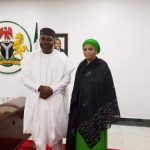Vice President Prof. Yemi Osinbajo has said having instituted reforms covering critical sectors of the economy over the past four years, Nigeria under the Buhari administration is making steady progress on the path of prosperity.
Osinbajo stated this on Saturday in Lagos in a keynote address he delivered at the Redeemer’s Men Fellowship Conference themed “Galvanized for Geometric Growth.”
The Vice President, while noting that much still needed to be done in the different sectors of the economy, restated that the country had enormous potential which would be realised.
According to the VP, who referenced the recent US-based Newsweek magazine’s special cover edition which described Nigeria as the Black China and Africa’s first super-power, “despite our challenges, Nigeria is the ‘last major open market, and like China and India, its population and economic size will enable economies of scale and attract international investment.”
Osinbajo said reforms by the Federal Government have over the past few years spurred progress and attracted investors’ interests across different sectors comprising agriculture, technology, tourism and entertainment, manufacturing amongst others.
“Just this week, the Spur Group, an IT company from China indicated that it will be establishing a computer hardware manufacturing plant in Nigeria.
“In the course of last year, the Mara Group of Ashish Thakkar had also indicated that it will set up a manufacturing plant for Mara Phones in Nigeria.
“Kobo360, which was one of the start-ups in a group that I led to Silicon Valley in July 2018, aggregates end-to-end haulage operations and raised $30m in a Series A round led by Goldman Sachs and Nigerian commercial banks.
“Using technology, Kobo360 has made it possible for providers of haulage services to find cargoes for their trailers on return journeys, in effect halving the cost of transporting goods,” the Vice President added.
Continuing, the Vice President said the potential of the Nigerian economy has also been boosted by the Buhari administration through direct and indirect investments in agriculture, manufacturing, technology and creative industries.
According to Prof. Osinbajo, “the story of increased rice production in Nigeria is well known, with production of paddy rice in 2019 estimated at 7.3 million metric tonnes compared to about 5 million metric tonnes in 2015.
“A little noticed phenomenon taking place in agriculture is the use of technology to attract crowdfunding into the sector. Given the huge interest in agriculture and the relative ease of investing through such platforms, we will see a huge increase in investment in agriculture and subsequent increases in agricultural output across the value chain.”
In the manufacturing sector, the Vice President said all critical indices have so far indicated significant improvements between 2018 and 2019.
He said, “this positive outlook for the manufacturing sector can be seen from the Leventis Group which, for instance, continues to make substantial investments in the Nigerian manufacturing sector through its subsidiaries, the Nigerian Bottling Company and Beta Glass.
“The Nigerian Bottling Company will soon be commissioning its Asejire Plant which has taken a substantial part of a recent $500 million investment in Nigeria while Beta Glass which makes the bottles for the pharmaceutical sector and for beverages like Coca-Cola and Star Beer has invested another $30 million to expand its furnace capacity.”
The technology sector, according to Prof. Osinbajo, “continues to hold out great promise.”
Citing recent industry reports, the Vice President said, “Nigerian start-ups attracted $122 million out of the $492 million in funding to the African start-up sector in 2019. Perhaps more compelling is the increasing use of e-payment channels within the economy.
“The value of Point of Sale (POS) transactions is reported to have reached over N3.2 trillion in 2019 as compared to N2.3 trillion in 2018, an increase of 38%, while the volume also increased by 153 million transactions to a total of 438 transactions in 2019.”
In the area of infrastructure, the Vice President disclosed that the Federal Government’s interventions through the various reforms would yield greater results.
Noting the efforts of the Buhari administration to address the country’s major infrastructure deficit, the VP said, “So our focus in the last few years has been on investing in roads, rail, and power. We have a major road project going on in every state of the federation.
“Some of the road projects scheduled for substantial completion in 2020/2021 include: Dualization of Suleja-Minna road, Ilorin-Jebba-Mokwa/Bokani road, Nnewi-Oduma-Mpu (in Enugu)-Uburu (Ebonyi), Yenagoa-Okaki-Kolo-Nembe-Brass road, Bodo-Bonny road with a bridge across the Opobo channel, the rehabilitation and expansion of Lagos-Badagry expressway and, of course, the Lagos-Ibadan expressway.”
He added that 19 other road projects measuring about 800 kilometres have been prioritised in 11 states across each of the six geo-political zones, which would be done by 10 local companies who have applied to join Dangote and NLNG in the Investment Tax Credit Scheme of the Federal Government encouraging private sector investments in infrastructure.





